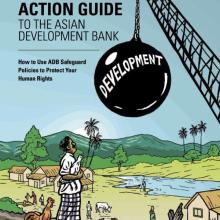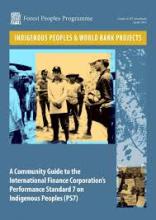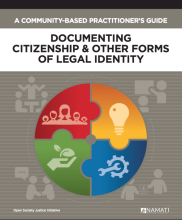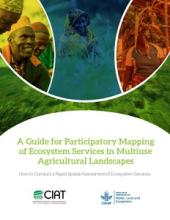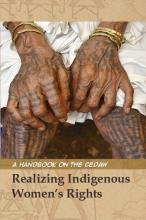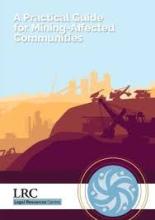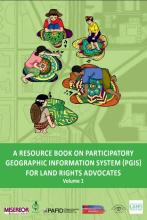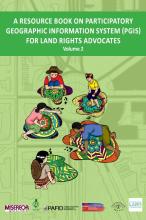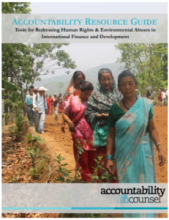Resources for Grassroots organisations
A Community Guide to the Asian Development Bank: How to Use ADB Safeguard Policies to Protect Your Human Rights
This guide provides a simple yet complete resource to help communities to understand the Asian Development Bank’s policies and use them for justice. While it focuses on the ADB, it also contains information that is useful for any campaign against destructive development—even if the ADB is not involved. The guide contains different kinds of information, including:
• Information about human rights and rights-based development
• Information about the Asian Development Bank and its safeguard policies
• Learning activities for community workshops
• Stories of the impacts of development projects, and ways that communities have defended themselves
• Advocacy tools to defend against destructive projects, to influence ADB plans, and to build campaigns for development justice
• Tips from community activists who have spent many years defending community rights.
A Community Guide to the International Finance Corporation’s Performance Standard 7 on Indigenous Peoples (PS7)
This guide helps communities, community-based organisations and other supporters know what to do if a company is planning to develop projects on or near their customary lands, using a loan from the International Finance Corporation (IFC) – the private sector part of the World Bank Group. This guide is also useful for any projects using loans from other funders or companies that have chosen to follow the IFC’s social and environmental rules.
A Community-Based Practitioner’s Guide: Documenting Citizenship and Other Forms of Legal Identity
This guide provides step-by-step instructions on establishing and operating a paralegal or other community-based program to help people obtain legal identity documents. It is primarily for people designing and managing community-based paralegal projects to help clients access documentary proof of citizenship and other forms of proof of legal identity, such as birth certificates. However, it will also be useful to those undertaking legal aid, litigation, and non-litigation advocacy work, as the issues that it seeks to address frequently lie at the intersection of laws and how they are applied in practice.
A Guide for participatory mapping of ecosystem services in multiuse agricultural landscapes: How to conduct a rapid spatial assessment of ecosystem services
This guide presents a step-by-step approach in using a participatory mapping method with community members to identify and map ecosystem services and changes in their supply across multiuse agricultural landscapes. Non-governmental organizations (NGOs), government agencies and researchers can use this approach to learn from communities about how they use and access natural resources. This activity uses a landscape approach to help land management practitioners understand the ways in which people depend on and access ecosystem services and how changes in their availability impact livelihoods across the landscape.
A Handbook on the CEDAW: Realizing Indigenous Women's Rights
This handbook is an introduction to the human rights of indigenous women. It provides some detail on the CEDAW as the only instrument specifically for women. It also provides a brief overview of the other available human rights mechanisms.
A Practical Guide for Mining-Affected Communities
This guide seeks to highlight the steps that concerned parties and communities can take to address the challenges that mining poses on communities. It gives communities the tools they need to understand the law that governs mining and to protect their rights. Although it focuses on South Africa, the tools proposed will be relevant for communities facing similar issues in other countries.
This resource is part of the CCSI’s Directory of Community Guidance on Agreements Relating to Agriculture or Forestry Investment.
A Resource Book on Participatory Geographic Information System (PGIS) for Land Rights Advocates (Volume 1)
This guide (volume 1) aims to equip land rights advocates, development practitioners and stallholder farmers and indigenous people’s communities with the necessary knowledge, attitude, and skills on Community Mapping and Participatory Geographic Information System (PGIS). It focuses on data collection, database management, data processing, and analysis for the production of digital maps useful in advancing the land rights agenda of rural communities, particularly indigenous communities and smallholder farmers in Southeast Asia. Thisfirst volume is designed to impart the key concepts of community mapping and the basics of participatory GIS (PGIS), with the view that the application of PGIS technology contributes to (1) securing legal recognition of the indigenous communities over their traditional territories and resources, and (2) for smallholder farmers and landless rural poor to defend their rights to land and the sustainable use of natural resources.
A Resource Book on Participatory Geographic Information System (PGIS) for Land Rights Advocates (Volume 2)
This guide (volume 2) aims to equip land rights advocates, development practitioners and stallholder farmers and indigenous people’s communities with the necessary knowledge, attitude, and skills on Community Mapping and Participatory Geographic Information System (PGIS). It focuses on data collection, database management, data processing, and analysis for the production of digital maps useful in advancing the land rights agenda of rural communities, particularly indigenous communities and smallholder farmers in Southeast Asia. This second volume is designed to impart on the “how-tos” for the production of digital maps useful in advancing the land rights agenda of rural communities, particularly indigenous communities and smallholder farmers in Southeast Asia.
Accountability Resource Guide: Tools for Redressing Human Rights & Environmental Abuses in International Finance and Development
This guide provides information for communities who are, or who may be, harmed by projects sponsored by financial institutions, development banks and private groups. It is intended to assist community leaders, lawyers, and non-governmental organizations (NGOs) in determining what rights communities have and how they may access accountability mechanisms when those rights have been or may be violated.
These tools may be used where a project has harmed communities or resources on which they depend or when there is fear of harm in the future.
This resource is part of the CCSI’s Directory of Community Guidance on Agreements Relating to Agriculture or Forestry Investment.
Asia Indigenous Peoples' Pact (AIPPS)'s Handbook: Extractive Industries and Free, Prior and Informed Consent of Indigenous Peoples
This handbook contains basic information needed by indigenous peoples to be able to exercise their right to FPIC in the face of mining activities affecting their communities. It can be used as a reference by indigenous communities and civil society organizations in understanding and raising awareness on extractive industries and FPIC.


